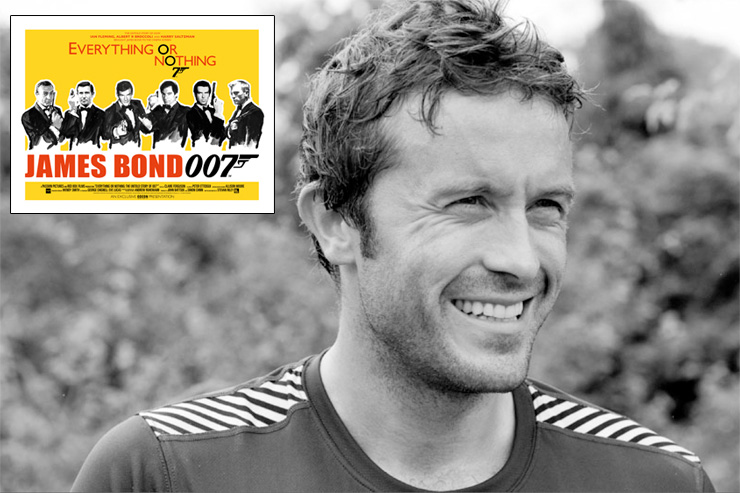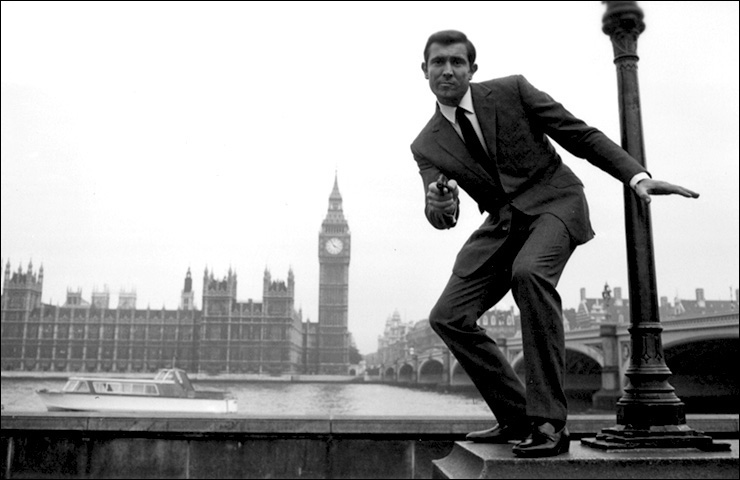50 YEARS OF JAMES BOND |
||
|
||
50 YEARS OF JAMES BOND |
||
|
||
 |
||||||
|
Everything Or Nothing hits the mark In the week that 007 fans celebrate 50 years since the release of Dr. No, LUKE WILLIAMS reviews Stevan Riley's documentary Everything Or Nothing: The Untold Story of 007, and finds it a refreshingly candid account of the history of the world's greatest film franchise.
With the individual Bond films’ production histories having been covered in admirable detail by John Cork and Bruce Scivally's ultimate edition DVD documentaries, and the series' 25th, 30th and 40th anniversaries all having been celebrated with official documentaries of varying quality, I sat down to watch Everything Or Nothing firmly of the opinion that yet another Bond documentary - this time to celebrate the series’ 50th anniversary - would be somewhat redundant. Furthermore, although produced by Passion Pictures and Red Box films, this is an official EON production in all but name and my expectation was that an officially sanctioned documentary such as this would tend to be sanitised and uncontroversial fare. My expectations couldn't have been more wrong; for in the hands of Stevan Riley, the talented director of the fascinating Varsity boxing documentary Blue Blood and the masterful Fire in Babylon, which examined West Indian cricket, Everything Or Nothing proves a surprisingly candid film, packed full of interesting insight and containing a range of engaging and honest interviews, as well as being wittily edited with a sense of style and joie de vivre. After a punchy and dynamic opening, which blends footage filmed especially for the documentary with shots of Daniel Craig from Casino Royale, and a unique and hugely enjoyable ‘sextet of Bonds’ gun-barrel sequence, Everything Or Nothing adopts a sensible chronological approach to its material. Riley eschews the hagiographical approach that voice-over led documentaries can lean towards and instead allows a series of interviewees to speak for themselves. If the archival footage and interviews used are, for the most part, pretty familiar to hardcore Bond fans, then where the film really scores is in the wide array of exclusive and new interview material filmed especially for this production. A wide range of significant Bond personnel are on show, from former 007s George Lazenby, Roger Moore, Timothy Dalton and Pierce Brosnan to current 007 Daniel Craig, as well as significant behind the scenes figures including Barbara Broccoli, Michael G. Wilson, Ken Adam, David Picker, Charles ‘Jerry’ Juroe, Bill Cartlidge and Lewis Gilbert. Of the former 007s, Lazenby is the most entertaining, as well as surprisingly moving in describing how his experiences as Bond affected him (“for a long time, I didn't really know who I was”); Dalton is the most passionate and articulate and Pierce Brosnan, perhaps inadvertently, is the most revealing, admitting he can't remember most of his post-GoldenEye output (lucky for you, Pierce! Wish we couldn't remember them too!) and displaying appropriate shame at the kite-surfing scene in Die Another Day. Moore, meanwhile, is as charming as ever, and although his comments add little to what we already know about himself or his time as Bond, it is interesting to hear him express his regret, given his later work for UNICEF, about a scene in The Man With The Golden Gun in which he shoves a Thai boy into a river (“I look back on that with absolute horror”). If the film is light on interviews with non-007 actors (Maud Adams, Robert Davi, Judi Dench, Famke Janssen and Rosamund Pike pop up briefly) then it's all the better for that - such interviews have been done to death on the DVD releases and chat-show circuit. The array of banal talking heads who normally populate such documentaries are also thankfully absent, bar brief comments from former president Bill Clinton and Austin Powers creator Mike Myers. Riley is to be applauded here for his editorial approach and decision not to tell the story of the stars who appeared in the Bond films, but instead to primarily focus on the figures of Ian Fleming and original series producers Albert R. ‘Cubby’ Broccoli and Harry Saltzman, detailing the struggle to get Bond on to screen in the first place - and then keep him there in the face of various financial and legal obstacles and travails.
Helping fill in the literary context and personality of Fleming, his social background and world-view are interviews with his distant cousin Christopher Lee, biographer John Pearson, niece Lucy Fleming, step-daughter Fionn Morgan, former companion Blanche Blackwell and literary agent Peter Janson-Smith. Blackwell steals the show here by recounting Fleming's first words on meeting her: “The first time I met him he came up to me and said, ‘I hope you're not a lesbian!’” Meanwhile, as well as detailed contributions from Broccoli's daughter Barbara and stepson Michael G. Wilson, Saltzman's children Steven and Hilary and his former assistant Sue St. Johns provide some valuable insights into the combustible but highly imaginative Saltzman, whose contribution to the Bond legend has been increasingly over-looked in recent years - a slight that Riley's film goes a long way towards rectifying. It's one of the most moving sections in the film when they recount their father's retreat into insularity after his wife Jacqueline's death from cancer, a retreat which was only reversed when he reconciled with Broccoli at the premiere of For Your Eyes Only.
As demonstrated by this section of the film, Everything Or Nothing is at its most interesting when dealing with the human conflicts of the first 50 years of 007 in the cinema - between Connery and Broccoli/Saltzman, between Saltzman and Broccoli and between Kevin McClory and the whole EON Productions machine. Perhaps the most compelling section in the entire film deals with Connery's dissatisfaction with his treatment and financial remuneration that led to his initial departure from the series after You Only Live Twice. It's quite a tribute to EON's willingness to allow Riley the creative freedom to make an honest film that we see David Picker, former United Artists head honcho, declare, damningly, of Broccoli & Saltzman's approach to managing Connery: “It was very bad judgement on their part. The fact is Cubby and Harry renegotiated their deal with us several times. They were keeping themselves happy, but they weren't keeping him happy. He didn't like it and I don't blame him.” Charles Juroe is also very illuminating in describing the deterioration in relations between Connery and Saltzman. As for Connery himself, new interview footage with the great man is conspicuous, but hardly surprising, by its absence. His reluctance to participate in any of the 50th anniversary jamboree has raised the ire of some Bond fans, which is pretty ridiculous, seeing as Connery has retired and long ago earned the right to decide what he does and when he does it! Although new Connery interview footage would have been welcome, Everything Or Nothing is ultimately, through Picker's aforementioned comments, as well as Barbara Broccoli's emotionally raw description of Connery's final phone call to her dying father, pretty even-handed when dealing with the complexities of his relationship with Bond and EON.
For all the emotion though, the overall theme to the film is a triumphal one - namely, the frequent ‘against the odds’ success of the Bond films. Despite the many obstacles placed in the way of first Fleming, then Broccoli & Saltzman, then Broccoli himself (upon assuming sole producer status with The Spy Who Loved Me) and, later on, Broccoli's successors Michael and Barbara, the series has endured and looks set to endure for years to come; as Daniel Craig states in the film's opening: “This is 50 years now and they've kept it going. It's unique within moviemaking.” In the final analysis, Riley [pictured left] has not crafted a film that teaches Bond aficionados anything particularly new, but he has succeeded in presenting an engaging, entertaining and honest overview of the series and its development. For that he deserves credit and, for giving him the creative licence to produce an official film which is characterised by unexpected candour, EON Productions deserve a huge slice of credit too. |
||||||
|
In the week his Bond documentary Everything Or Nothing hits cinema screens, LUKE WILLIAMS chatted with acclaimed film-maker Stevan Riley exclusively for 007 MAGAZINE. Bond fans have been spoilt for documentaries in significant ‘anniversary’ years; the first I remember seeing was 1987's Happy Anniversary 007, hosted by Roger Moore, which was little more than a light-hearted clips compilation of Bond series high points. More recently, the justly praised DVD ‘ultimate edition’ releases were packed with more in-depth documentary features examining many aspects of the Bond phenomenon. However, Stevan Riley's Everything Or Nothing is arguably the finest Bond documentary we have yet seen. Appropriately timed to hit selected cinema screens to coincide with the exact anniversary of the original release of Dr. No on October 5th 1962, Riley's film manages to celebrate EON Productions’ impressive achievement in keeping Bond on our screens for 50 years without sugar-coating some of the more controversial or troubled moments in the series’ history. Riley, a thoughtful and talented former Oxford University history graduate, has already directed the acclaimed sporting documentaries Blue Blood and Fire In Babylon, and kindly shared his thoughts on his new film with 007 MAGAZINE. Congratulations on
Everything Or Nothing, which I've seen and enjoyed very much! What was
your overall concept for the film? Exactly! With so many
interview subjects it must have been difficult to decide what to include
and what to leave out! How did you prepare for such a vast challenge?
|
||||||
|
Did you have a team
helping you conduct the interviews? You managed to coax
some quite candid remarks from your interviewees. How did you manage that?
With so much interview
material might we be seeing some juicy extras on a future DVD release?
Or maybe a director's
cut of Everything Or Nothing? |
||||||
 |
||||||
|
Back to the film
itself - I thought the opening sequence was very dynamic and set the tone
nicely. How did you conceive and film it? Who was responsible for the
gun-barrel, which I thought was a very effective bit of digital trickery?
I thought it was an
unusually honest film for an ‘officially sanctioned’ documentary. Were you
surprised you were given the freedom to include material that was, for
example, quite critical at times of producers Albert R. Broccoli and Harry
Saltzman. For example, what [former United Artists executive] David Picker
said with regards to their treatment of Sean Connery? |
||||||
 |
||||||
|
I saw that you were
quoted as saying that you thought that anyone who tried to “live the myth”
of Bond "came unstuck". Can you expand on what you meant by that? I thought Lazenby's
comments were quite interesting and moving really. He obviously got caught
up in the whole whirlwind of the Bond image and didn't really know how to
handle it at the time. Interestingly 007
MAGAZINE readers recently voted OHMSS the best Bond film ever. I also thought you
dealt with the Dalton era in an interesting way. It was interesting to
hear Barbara Broccoli say that he was “ahead of his time”, which is
something I'd definitely agree with. 007 MAGAZINE thanks Stevan Riley for speaking with us and wishes him good luck with Everything Or Nothing! Everything Or Nothing: The Untold Story of 007 will be released on DVD January 28th 2013 |